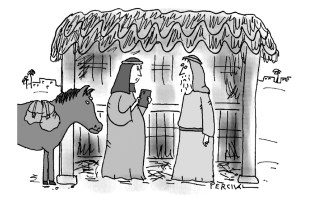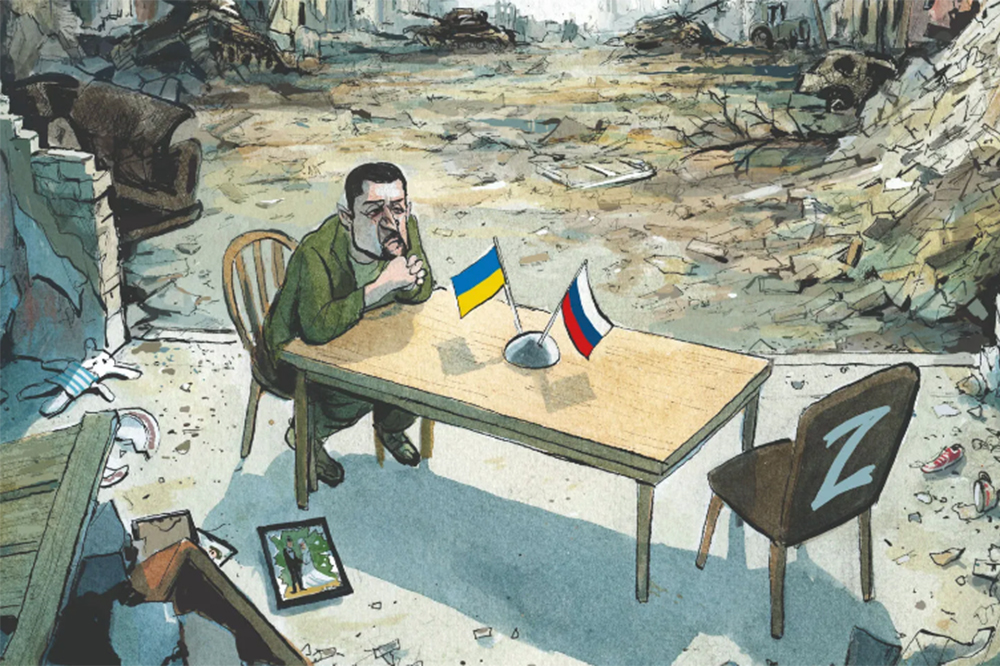Apologies for this seasonal downer. Had the website such a listing, this column would surely soar to number one in The Spectator’s ‘Least Popular’ roster. For just now, few topics are a bigger turn-off than Ukraine.
Following Russia’s invasion, I got caught up in the same waves of emotion that washed over most western publics, and I say that with no regret. After relentlessly battling the prevailing cultural winds these past few years, I was relieved to feel a sense of solidarity for once. Most of us were revulsed by the gratuitous aggression, allied with an underdog whose bite proved surprisingly fierce, thrilled by a former comedian’s unexpected rise to his nation’s occasion and consumed by a weirdly addictive loathing for Vladimir Putin. Kyiv’s repelling Russia’s clumsy invasion of the capital was exhilarating. Like so many of you, in those early months I read about Ukraine every day.
This is the middle bit of a novel where if nothing appreciable happens the reader is apt to put the book down
I don’t any more. I bet most of you don’t either. Why, as grotesque as 7 October was, I sensed in our collective pivot to the Middle East this autumn an odd undercurrent of gladness that now we could plunge up to the neck into a different story. Ukraine suddenly seemed yesterday’s news; background news. But for Ukrainians, their war is still roiling very much in the present and is being conducted anywhere but in the background.
I’m no foreign policy wonk but I do know something about stories, and observers of international news constitute an audience, a readership. From the off, this story had a spectacular opening chapter, a classic hero – personified by Volodymyr Zelensky, but more crucially the Ukrainian people – and as wicked a villain as Shakespeare could have contrived. To begin with, too, our tale was punctuated by riveting dramatic events: the outrageous slaughter of civilians in Bucha; the triumphant sinking in the Black Sea of Russia’s grand warship the Moskva; the gratifying liberation of Kharkiv, as the once-intimidating Russian army beat a humiliating retreat; the sly and, for Putin, infuriating bombing of his fancy bridge to Crimea.
But if we fast-forward, Ukraine’s counteroffensive last summer was a damp squib. For months on end, every centimetre of liberated territory has been gained through huge loss of life and munitions. The Russians are dug in, their confiscated eastern regions heavily fortified. The battle lines having barely moved for months, the conflict’s visuals now recollect the meat-grinding Western Front of the first world war. Our plot has stalled. This is the middle bit of a novel where if nothing appreciable happens for long enough the reader is apt to put the book down.

For us observers, this is supposed to be a David and Goliath story. But David and Goliath is a crap story if the giant wins. The big bloke pummels the little bloke? Predictable, a bit disheartening and not really a story at all, just the way the world works. Besides, a western audience wants to see the good guy win, both to mete out justice and to enjoy victory by proxy. Sophisticated literature often resolves with more complexity – with bitterness, irony or tragedy – but that’s one reason literary fiction is less popular than the commercial kind. Most people prefer happy endings. Any bestselling thriller writer would subject the Ukrainians to plenty of nail-biting adversity, but Zelensky would finally triumph, reclaiming all his nation’s occupied territory, including Crimea.
Ukraine’s anguishing self-defence is not a novel. But we’re quietly losing interest in this conflict – I include myself – because it’s not satisfying our fictional appetites. Recall that about a year ago I worried here that our narrative expectations of this war may be taking us into the realm of fantasy. I observed glumly that the war’s probable resolution is an ugly moral compromise that sacrifices a goodly chunk of a sovereign nation to a monomaniacal bully – who will doubtless spin Ukrainian concessions as a dazzling military success, one that redeems for the Russian people his unprovoked aggression and the many deaths of their sons, brothers and fathers.
This endgame is more likely than ever. I’m not happy about that. In fact, it makes me sick. But the average age of the Ukrainian army is now 43 – a statistic that makes me even sicker. They’re running out of young men, not because the young men won’t serve but because they’re dead. Ukrainian women are being sent to the front lines. Russia had nearly four times the population of Ukraine before the war; given the reduced population in Kyiv-controlled areas, the countries are now mismatched in manpower by a factor of five. With his legacy and political future on the line, Putin is clearly all-in for the long haul. The easily manipulated Russian public have not rebelled. Putin’s inner sanctum hasn’t staged a coup. Russian GDP has increased since last year. The rouble started rising against the dollar. Western sanctions have failed.
I don’t share the view of many US Republicans that Ukraine should be thrown under a bus because the country is none of our business and America should spend taxpayers’ money on solutions to its own problems. But just because the conflict’s resolution has major geopolitical ramifications doesn’t mean we can write our own happy ending. No matter how much ordnance the US and Nato ship to Zelensky, we’re not providing the soldiers obliged to wield it. I say this with a heavy heart: if the writing is on the wall – if a negotiated settlement that cedes captured territory to Putin looks inevitable – maybe it’s time to urge the Zelensky government to enter talks to bring this depressing war to its depressing conclusion. Dragging out an entrenched stalemate merely racks up a higher body count and destroys more Ukrainian homes and infrastructure to no purpose. Sitting back and giving Ukrainians just enough weaponry to keep fighting to the last man and woman, only for the country to finally end up where we always knew it would, is not just immoral. It’s murder.







Comments